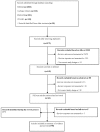Effects of Fruit and Vegetable Consumption on Risk of Asthma, Wheezing and Immune Responses: A Systematic Review and Meta-Analysis
- PMID: 28353635
- PMCID: PMC5409680
- DOI: 10.3390/nu9040341
Effects of Fruit and Vegetable Consumption on Risk of Asthma, Wheezing and Immune Responses: A Systematic Review and Meta-Analysis
Abstract
Abstract: Evidence suggests that reduced intake of fruit and vegetables may play a critical role in the development of asthma and allergies. The present review aimed to summarize the evidence for the association between fruit and vegetable intake, risk of asthma/wheeze and immune responses. Databases including PubMed, Cochrane, CINAHL and EMBASE were searched up to June 2016. Studies that investigated the effects of fruit and vegetable intake on risk of asthma/wheeze and immune responses were considered eligible (n = 58). Studies used cross-sectional (n = 30), cohort (n = 13), case-control (n = 8) and experimental (n = 7) designs. Most of the studies (n = 30) reported beneficial associations of fruit and vegetable consumption with risk of asthma and/or respiratory function, while eight studies found no significant relationship. Some studies (n = 20) reported mixed results, as they found a negative association between fruit only or vegetable only, and asthma. In addition, the meta-analyses in both adults and children showed inverse associations between fruit intake and risk of prevalent wheeze and asthma severity (p < 0.05). Likewise, vegetable intake was negatively associated with risk of prevalent asthma (p < 0.05). Seven studies examined immune responses in relation to fruit and vegetable intake in asthma, with n = 6 showing a protective effect against either systemic or airway inflammation. Fruit and vegetable consumption appears to be protective against asthma.
Keywords: antioxidant; asthma; fruit; immune response; vegetable; wheezing.
Conflict of interest statement
The authors declare no conflict of interest.
Figures









References
Publication types
MeSH terms
LinkOut - more resources
Full Text Sources
Other Literature Sources
Medical

